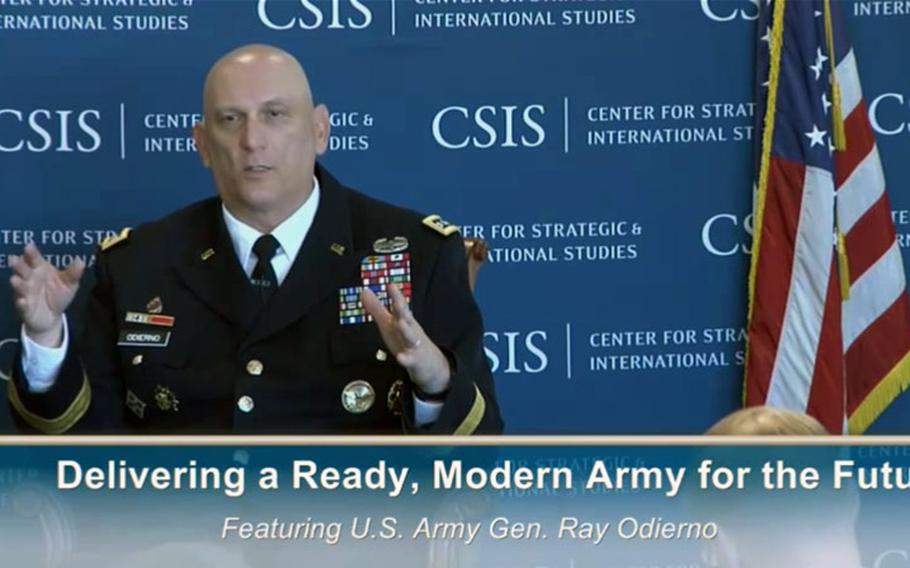U.S.
Odierno: US hopes to rebuild ties with Russia eventually
Stars and Stripes March 14, 2014

Gen. Ray Odierno speaks about the future of the Army during a forum at the Center for Strategic and International Studies Thursday, March 13, 2013, in Washington, D.C. (Center for Strategic & International Studies/YouTube video screen shot)
SEOUL — Even with Russian troops massing along the Ukrainian border and tensions mounting in Crimea over an upcoming secession vote, the Army’s chief of staff says the U.S. hopes to rebuild its relationship with Moscow eventually.
“We might have to wait a little bit because of what’s going on in the Ukraine,” Gen. Ray Odierno told a forum Thursday at the Center for Strategic and International Studies in Washington, D.C. “Hopefully in the future we’ll be able to continue our relationship with Russia, even though right now we are not.”
He spoke for nearly an hour about the future of the Army in the wake of expected large-scale troop reductions and budget cuts. He warned that reducing troop levels significantly will hinder the Army’s ability to respond to future wars and could require the U.S. to resort to “national mobilization” beyond the National Guard and reserve forces.
Last month, Odierno visited Japan and South Korea and held “very substantive” meetings with top army officials in China who are pushing for increased dialogue between the two militaries. He said the U.S. wants to increase the number of military exercises with Beijing, and noted that the two militaries recently finished a joint humanitarian drill in Hawaii and are planning for a similar exercise.
“This is by far the biggest step that we’ve taken in many, many years in trying to open up this relationship between our armies,” he said.
He said the burgeoning military-to-military relationship with Beijing would not replace U.S. ties with Russia.
“I think it’s dangerous to say we’re going to pick sides and say `OK, now we’re going to do more exercises with China and we’re going to ignore Russia,’ ” he said. “My 38 years of experience tells me we want to keep all doors open and we want to try to continue to develop relationships across the board.”
Asked what possible conflict would pose the most danger for deploying troops, Odierno cited a war on the Korean peninsula, saying it would be “incredibly difficult” and “incredibly dangerous.”
“For me, it’s about stability on the Korean peninsula, and the concerns we have now is miscalculation,” he said. “We don’t want miscalculation, so it’s important for us to provide the support necessary so we don’t have miscalculation, which could lead to unwanted provocations on the peninsula.”
He said budget constraints and force reductions would not affect America’s military commitment to South Korea, though “how we do it might be different,” particularly after the transfer of wartime operational control to Seoul.
If a war broke out on the peninsula today, the top U.S. commander would lead the joint forces. That authority is scheduled to transfer to South Korea in December 2015, though Seoul has requested a delay because of security concerns over North Korea. A decision is expected this year.
He said the recent deployment of a Texas-based cavalry battalion to South Korea is an example of what the U.S. force presence there might eventually look like.
“It might go to a rotational presence in Korea, but in my mind that actually increases readiness and capability on the peninsula,” he said, adding that “it won’t change the nature of the relationship.”